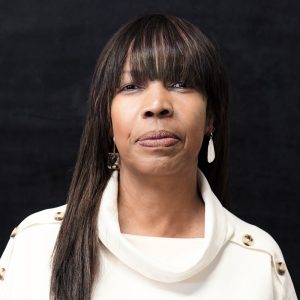Tiffany Douglass
Senior Vice President, Market Manager
Bank of America
When Tiffany Douglass talks about finance and corporate interests, she sounds a lot more like a community advocate than a banker. Here’s a woman who understands and empathizes with Detroiters, some of whom no longer live pay check to pay check, but are instead living pay check to Monday. In that respect Douglass is not your typical banker. She is, instead, a woman with her finger on the pulse of the community and the means to administer economic triage to help revive Detroit’s ailing neighborhoods. –roz edward
What are your daily responsibilities in your capacity as a senior vice president?
I am responsible for business integration, and that means dissemination of foundation dollars to leveraging our position in the community … whether that’s coordinating volunteer initiatives to understanding the environment in which we operate. It’s a multitude of things, but primarily it’s business integration and managing a corporate social responsibility platform, meaning access to education, economic development and identifying partners to make sure that we are responding to community needs.
How did you get prepared for this position?
I came from the nonprofit world where I was responsible for raising dollars and managing two different offices for the organization in the Twin Cities of Minneapolis and St. Paul, which is where I’m from. I later came to Detroit, where I was responsible for managing the financials, raising the dollars, and leveraging volunteer support in the community.
When did it become clear to you that you were doing what you were called to do professionally?
Probably in the year 2002, when I really found my passion and understood that I could deliver for the community — that was a wonderful feeling. I was raising money for the United Negro College Fund, and I really got that I was helping a group of people who might not otherwise have had access to education. It was a tremendous feeling when you see that happen.
What are your thoughts on being a powerful woman?
I don’t know that I am necessarily a powerful woman. My power resides in my passion and knowing who I am and what I am supposed to do. That means taking care of my family first and taking care of me. And those are the reasons for my corporate position. It’s very much an everyday struggle that a woman feels in trying to be a mom, a wife, a working woman and a citizen of the community. So, it can be quite challenging, but it’s the everyday balancing gig that we all do and are challenged about everyday. You just do what you can do.
How do you define success?
I think that being successful means you’re trying your hardest, and you’re doing the best that you can do on a daily basis. I don’t think it’s reaching any level or that it can be found in a title. I am not defined by my title. I don’t get better access, nor am I precluded by my title.
If you can wake up and say “I feel pretty good about where I am, and I am happy about being in this place and space,” that’s success.
How can black women increase their income and their net worth?
The main thing for our people is education. We have to think beyond today, and think about tomorrow, meaning two years or five years into the future. A lot of people get intimidated by the [present] moment, and then they don’t really invest in themselves fully and take advantage of the educational opportunities in front of them. … You have to take the means that you have and leverage them … to move beyond your current level. That’s why access to education is the greatest thing we can do.
What motivates you?
My kids motivate me to be the best that I can be — for them and my community. Here in Detroit, we have an interesting community of people that really encourage you as a person of color to move forward. In most cases in this city, as a person of color, you are not the first one to do anything, which means you don’t have the excuse of saying that it hasn’t been done before. You have role models here in corporate America, in philanthropy, in community and political leadership. You see who you could be all around you here, and they are great assets.











